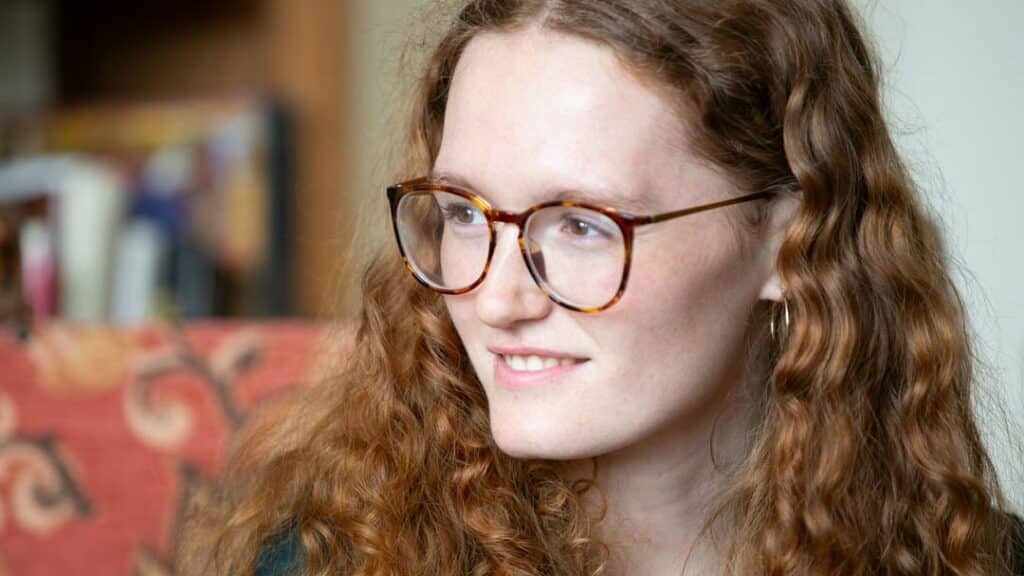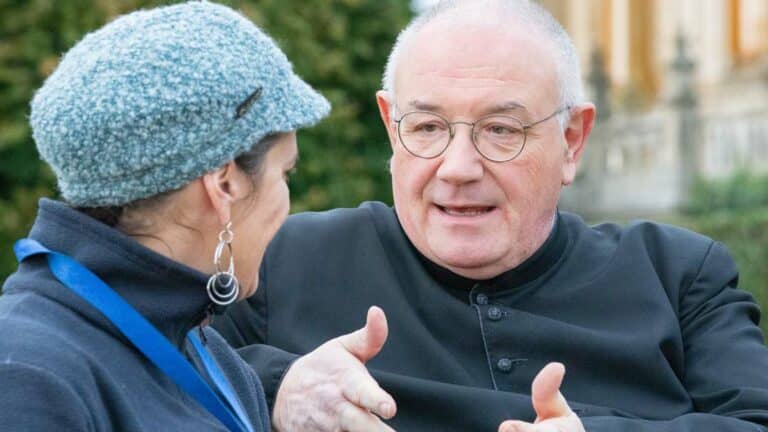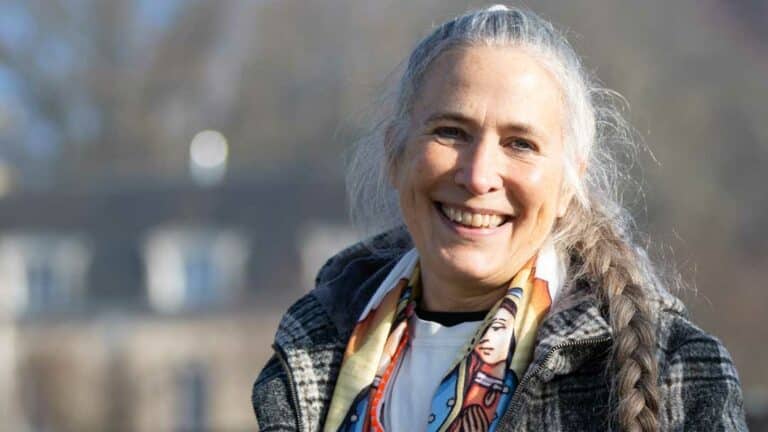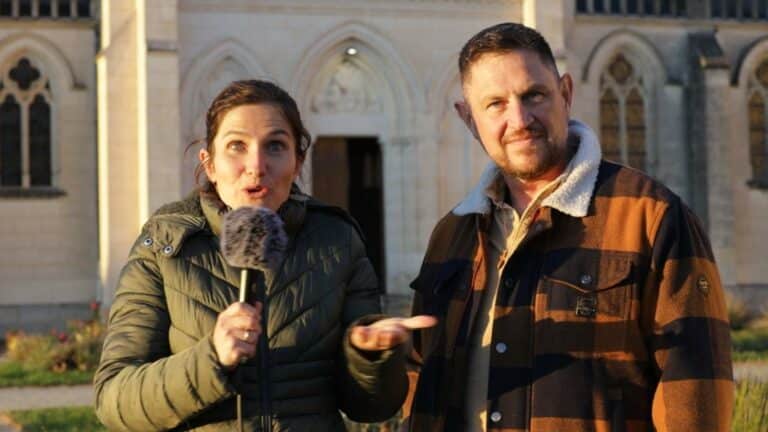From the United States to the Shrine of Montligeon, Madeleine shares her journey of mourning for her father, who passed on seven months prior.
It’s a long way from America to the tiny village of Montligeon, in Normandy, France. Quite a journey to undertake, with only the fuzziest idea of the destination! But so it is with mourning. In this testimony, Madeleine tells us about the social pressure to “move on”, and to do it fast. About her need to slow things down and take the time to feel. About her need to go back, too. This trip to France was for her an opportunity to reconnect with her French roots, her father’s side of the family, her faith. At the Shrine, during the two-day retreat, she found a space in which to contemplate and pray, and people with whom she could share her experience. The teachings on the afterlife and the communion of saints touched her, and enabled her to reconnect with the spiritual dimension of grief she had to leave dormant in order to complete the mandatory tasks that fall to those who remain. “I just wanted to mourn my father”, she says simply. Montligeon gave her that, as well as an unexpected consolation.
I’ve come in search of peace
« Hello. My name is Madeleine. » That is how she introduces herself, with simplicity. An American, this is her first time attending one of the mourning retreats of the Shrine of Notre-Dame de Montligeon. She has just been through an ordeal: the death of her father seven months prior. This loss has affected her deeply. Not only because of the absence, but also because of the wounds left by an unfinished relationship.
She didn’t do it all alone. She signed up for the retreat with her grandmother, her father’s mother. Together, they travelled to this Shrine, hidden among the hills and forests of the historical region of the Perche, in Normandy. She came looking for peace, consolation, and perhaps even forgiveness.
Madeleine at the Shrine on June 6, 2025
Rediscovering my faith
She first heard about Montligeon from her aunt, her father’s sister. Madeleine took her advice to heart. It was an invitation to embark on a journey in which faith played a central role. She explains: “The Catholic religion is very important to my grandmother. It was also important to my father. I think he rediscovered his faith before he died.”
Her father’s going back to the Catholic faith toward the end of his life had a profound impact on her. Madeleine seeks not only to understand what happened to him, but also to rediscover the spiritual bond that unites them. She is very clear about it: “Being able to return to France and rediscover my own faith helped me feel a certain connection with him.”
Reconnecting with my father
The father she mourns today, she didn’t get to know him as much as she would have liked. Her grief is mingled with regret. “I had a strained relationship with my father. And I’ve been missing that connection. Missing that lost time.”
For Madeleine, it’s not just about coming to terms with an absence, but also revisiting a history marked by estrangement, misunderstanding, and perhaps even pain. This retreat at Montligeon enabled her to find a space where she didn’t have to quickly turn over a new leaf, but where she could come back to certain painful chapters of her life with a different perspective.
With great emotion, she relates what she was able to experience during this time of rest: “It’s been really great for me to be able to reconnect with him thanks to my family here.” By coming to this place, she has found a way toward reconciliation. Not through fantasy or oblivion, but through a real understanding of who he was, with his contradictions, his history, his culture, and also his choices.
Finding my roots
Reconnecting with her father also means rediscovering her roots on his side of the family. “I was able to discover more about his culture, his language. All of the things that made him him.” Her father became an American citizen shortly before his death. His personal history, his identity were built on both worlds.
Madeleine doesn’t approach this heritage with an intellectual or genealogical mindset. She rather sees it as a way toward inner unification. “Reconnecting with them really helped me understand who I am.” “Them”, meaning the living – her grandmother, her aunt, her extended family – but also the deceased. A family history that she is starting to explore through her stay in Montligeon.
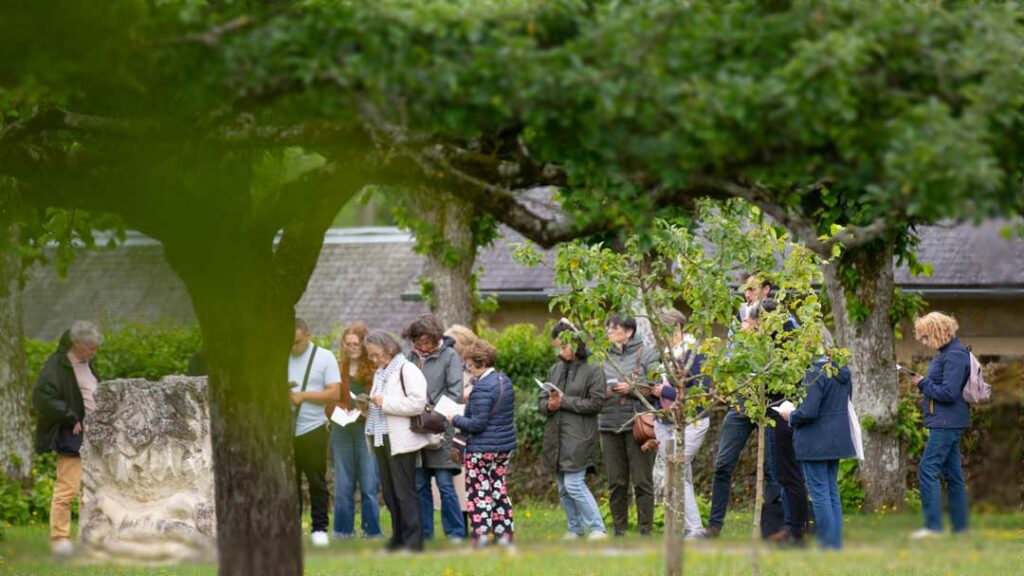
Rediscovering my family
“I discovered a great family I had previously no access to.” Here, the mourning retreat brings new clarity on family relations. By taking a step out, by making time, she sees the bonds that connect her with her family members, both living and departed. She finally gets to put faces, anecdotes, actions, on a family history formerly veiled by the blur of remoteness.
This might be one of the most precious aspects of her time spent in Montligeon: putting the relationship back in the center of our lives. Not as an idealised vision, but as a reality, complete with its fragilities, silences, and hopes. In the context of a retreat, discussions and silence coexist freely and easily. Participants can progress at their own pace, and count on the respect of others.
A transforming retreat
Day by day, Madeleine feels that something is shifting inside of her, from sorrow making its slow way toward peace and gratitude.
Such a change doesn’t come about with a wave of a magic wand. It flourishes in the environment of prayer, study of the Word, deep conversations, and trust, that is particular to such retreats. Here, we pray for our deceased? We speak about the afterlife, the divine mercy, the hope in eternal life. This christian perspective on death isn’t about turning a new leaf. It’s about shining a light on our grief and transcending it.
Madeleine underlines the consolation and support she received from the chaplains, the sisters, and the other pilgrims she met at the Shrine Our Lady of Montligeon. “It was an amazingly supportive group. It was such a beautiful experience to be surrounded by people from all different parts of life, going through a very similar experience. We’ve listened to a few different lectures about the afterlife, about praying for your lost loved ones. And we’ve also been able to participate in a few ceremonies within the Basilica. We had one last night where we submitted prayers for our lost loved ones. I think everyone cried, I was a mess. And it really, really touched me. It was very hard. And I had so many people come up to me afterwards, and give me words of encouragement, hugs, and kisses.”
A shrine to find peace
Madeleine emphasizes how much the shrine’s environment helped her. Montligeon isn’t just a place of great natural beauty. It is a living place, where the prayer intentions, masses for the dead, discussions on spiritual topics, support the grieving along their mourning journeys. This retreat is different from therapy, even though it offers a similar relief. It is above all a human and spiritual experience, grounded in faith.
“I think my dad would have been glad to know I’m here.” With this statement, Madeleine hints at newfound inner peace and, maybe, a newfound proximity to her father. Prayer, times spent in silence, rediscovering her own faith, all these things allowed her to make a connection, invisible yet real, with her deceased father.
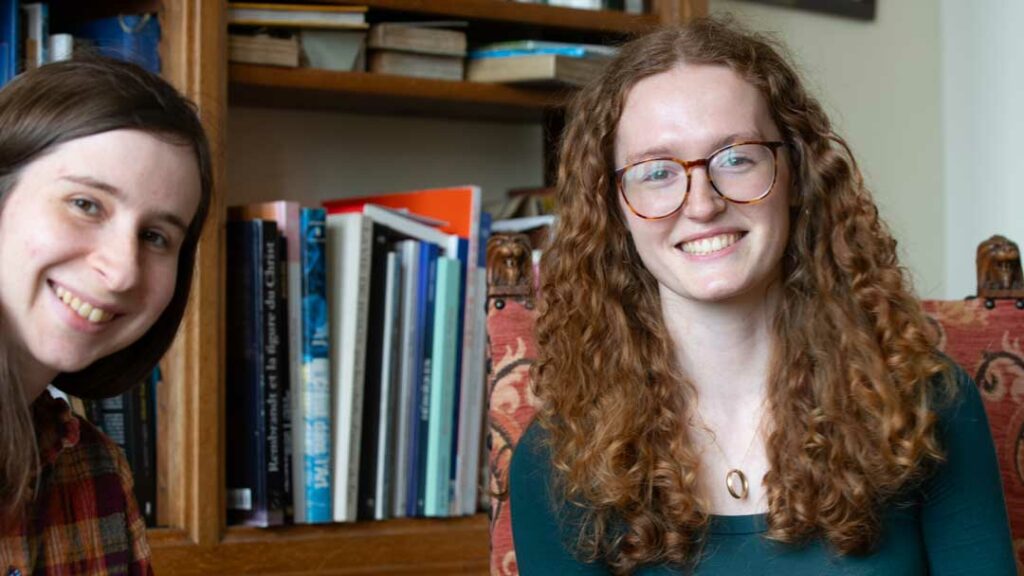
Why was my father taken from me?
“I’ve been asked if I felt anger toward God, or with whomever. This question came up again during the first lecture series that we had with Sister Cécile. We went through the stages of grief and discussed that it’s never a linear process. It’s very much a spiral. You can make progress, just to go back.”
As if to illustrate her words, her hand traces a spiral in the air.
“We may have dips, but we are always, always rising. Hopefully. And something that I found interesting in that lecture with my own experience was that I don’t. I don’t feel like I’ve ever truly been angry. I have wondered why.
“My dad was 56 years old when he died. He was not terminally ill. He smoked, like French men do. But he was healthy. He exercised. He took care of himself towards the end of his life. And so I have asked myself – why? Why was he taken from me?
Why was I not given the chance to reinvigorate our relationship?
It’s never been from a place of anger. It’s been more so from confusion, a lack of an explanation. But that has never been directed at anyone specific and never towards God. Never. Never. I wouldn’t use the word anger to describe it. More so, confusion.
Teachings that’ll stay with me forever
At the end of this two-day retreat, Madeleine leaves a different person. Not because she has “moved on”. But, rather, because she has let herself be vulnerable. Because she has dared to open the door to inner reconciliation. And because she has let her father in her life, her memories, her faith.
“I can say with certainty that it has been very beneficial for me. I feel much closer to my father, my gra“I can say with certainty that it was definitely beneficial. I feel so much closer to my dad, to my grandma, to my family and my roots in France. The Catholic religion is very central to the French people. And so it definitely has touched my heart, touched my core.
“I will take these teachings with me for the rest of my life. It’s been a beautiful experience.
“I think the most important thing I will take from this experience is patience. Patience and understanding, and the ability and willingness to provide a space for everyone, whatever their beliefs. The Catholic faith is beautiful and helps immensely with the bereavement process.”
Montligeon, a place for grief, is also a place for hope. You come wounded, and leave with a greater sense of peace. “I’m really glad I could experience this”, Madeleine concludes.

